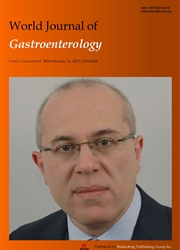

 中文摘要:
中文摘要:
AIM:To investigate the expression of interleukin (IL)-22 and its related proteins in biopsy specimens from patients with ulcerative colitis (UC) and UC-related carcinogenesis. METHODS:Biopsy specimens were obtained from patients with inactive (n = 10), mild-to-moderately active (n = 30), severely active (n = 34), initial (n = 30), and chronic UC (n = 44), as well as UC patients with dysplasia (n = 10). Specimens from patients without colonic abnormalities (n = 20) served as controls. Chronic colitis in experimental mice was induced by 2.5% dextran sodium sulfate. The expression levels of IL-22, IL-23, IL-22R1 and phosphorylated STAT3 (p- STAT3) were determined by immunohistochemistry. Bcl-2, cyclin D1 and survivin expression was detected by Western blotting. RESULTS:Patients with active UC had significantly more IL-22, IL-23, IL-22R1 and p-STAT3-positive cells than the patients with inactive UC and normal controls. Furthermore, IL-22 and related proteins were closely related to the severity of the colitis. The expression of IL-22 and IL-22R1 in the tissue of initial UC was stronger than in that of chronic UC, whereas the expression of p-STAT3 was significantly increased in chronic UC tissues. In dysplasia tissues, the expression level of IL-22 and related proteins was higher compared with controls. Mouse colitis model showed that expression of IL-22, IL-22R1 and IL-23 was increased with time, p-STAT3 and the downstream gene were also remarkably upregulated.CONCLUSION:IL-22/STAT3 signaling pathway may be related to UC and UC-induced carcinogenesis and IL-22 can be used as a biomarker in judging the severity of UC.
 英文摘要:
英文摘要:
AIM: To investigate the expression of interleukin (IL)-22 and its related proteins in biopsy specimens from patients with ulcerative colitis (UC) and UC-related carcinogenesis. METHODS: Biopsy specimens were obtained from patients with inactive (n = 10), mild-to-moderately active (n = 30), severely active (n = 34), initial (n = 30), and chronic UC (n = 44), as well as UC patients with dysplasia (n = 10). Specimens from patients without colonic abnormalities (n = 20) served as controls. Chronic colitis in experimental mice was induced by 2.5% dextran sodium sulfate. The expression levels of IL-22, IL-23, IL-22R1 and phosphorylated STAT3 (p-STAT3) were determined by immunohistochemistry. Bcl-2, cyclin D1 and survivin expression was detected by Western blotting. RESULTS: Patients with active UC had significantly more IL-22, IL-23, IL-22R1 and p-STAT3-positive cells than the patients with inactive UC and normal controls. Furthermore, IL-22 and related proteins were closely related to the severity of the colitis. The expression of IL-22 and IL-22R1 in the tissue of initial UC was stronger than in that of chronic UC, whereas the expression of p-STAT3 was significantly increased in chronic UC tissues. In dysplasia tissues, the expression level of IL-22 and related proteins was higher compared with controls. Mouse colitis model showed that expression of IL-22, IL-22R1 and IL-23 was increased with time, p-STAT3 and the downstream gene were also remarkably upregulated. CONCLUSION: IL-22/STAT3 signaling pathway may be related to UC and UC-induced carcinogenesis and IL-22 can be used as a biomarker in judging the severity of UC.
 同期刊论文项目
同期刊论文项目
 同项目期刊论文
同项目期刊论文
 Metabolomic approach to evaluating adriamycin pharmacodynamics and resistance in breast cancer cells
Metabolomic approach to evaluating adriamycin pharmacodynamics and resistance in breast cancer cells 期刊信息
期刊信息
